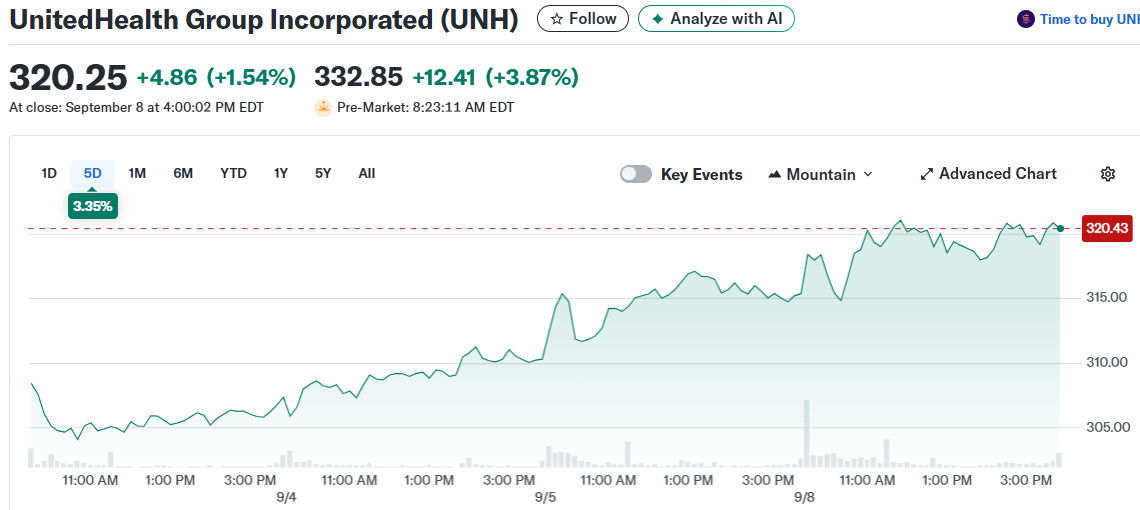TLDR
- UnitedHealth expects 78% of Medicare members in 4-star or higher plans, meeting projections
- UNH stock surged 4.1% to $333.29 in premarket trading Tuesday
- Justice Department probe into Medicare Advantage practices continues
- Earnings dropped sharply with medical care ratio rising to 89% from 86% forecast
- Company deploying AI tools and exiting unprofitable plans to control costs
UnitedHealth Group delivered positive news Tuesday, announcing Medicare plan enrollment will align with company expectations. The healthcare giant expects approximately 78% of Medicare members to enroll in 4-star or higher rated plans for 2026.

These star ratings from the Centers for Medicare and Medicaid Services influence consumer choices and government reimbursement rates. Higher ratings typically attract more enrollees and generate better payment terms from federal programs.
UNH stock responded favorably to the announcement. Shares climbed 4.1% to $333.29 during premarket trading, providing relief for investors who have watched the stock lose roughly half its value since April highs above $630.
The Medicare enrollment update offers a bright spot during a challenging period for the nation’s largest health insurer. UnitedHealth has faced multiple headwinds that have pressured both earnings and share price performance.
Federal Investigation Creates Uncertainty
The Justice Department launched an investigation into UnitedHealth’s Medicare Advantage practices earlier this year. The probe has created ongoing uncertainty around the company’s core business operations.
UnitedHealth maintains it’s cooperating fully with government requests. The company referenced its compliance history, noting that a previous decade-long civil challenge found no evidence of wrongdoing.
However, federal investigations can extend for considerable periods. This regulatory overhang continues weighing on investor sentiment and stock valuation.
Rising Healthcare Costs Pressure Profits
UnitedHealth’s recent earnings results highlighted escalating healthcare cost pressures. The company underestimated patient utilization of medical services in the latest quarter.
Adjusted earnings per share fell dramatically to $4.08 from $6.80 in the prior year period. This decline reflected higher-than-expected medical expenses across the business.
The company’s medical care ratio now exceeds 89%, up from earlier forecasts of approximately 86%. This metric measures premium revenue spent on patient claims and directly impacts profitability.
Recovery Strategy Takes Shape
UnitedHealth has outlined plans to address current challenges. The company is exiting certain unprofitable insurance plans while raising premiums where market conditions allow.
Management is also implementing artificial intelligence tools to streamline administrative operations. These technology investments aim to reduce operational costs and improve efficiency over time.
The company’s market position provides advantages during this recovery period. UnitedHealth operates both insurance and healthcare service divisions, creating an integrated ecosystem that competitors struggle to replicate.
UNH stock currently trades at 19 times forward earnings estimates, down from over 32 times in April. This valuation decline reflects investor concerns about profitability pressures and regulatory risks.
The 2026 star ratings data from CMS hasn’t been officially released, but UnitedHealth appears confident in maintaining high-quality Medicare plan scores. These ratings will be crucial for enrollment levels and reimbursement rates in the coming year.





